|
The Hellenic Genocide
Quotes from historical documents and related Photos. |
|||
CHAPTER III: "The reign of terror, the Turks’ immemorial method of rule, was on in earnest, and the next step taken to generalize it was the so-called "disarming". This meant, as always, the disarming of the Christian element, and the furnishing of weapons to the Turks. An order was issued that all persons must give up their guns and other weapons, and squads of soldiers were sent out through villages to put this edict into effect. That the object was not so much to collect hidden arms as to terrorize the inhabitants was soon made evident from the tortures inflicted during the search. Bastinadoing was a favorite measure. The feet of the peasants, accustomed to going barefoot, were very tough; they were therefore tied down and their toes beaten to a pulp with clubs." CHAPTER III: "Another form of torment frequently resorted to by the "Government of Union and Progress," was tying a rope around the victim’s waist and slipping a musket between the body and the cord and twisting until internal injury resulted. Priests were frequent victims of this campaign of terror and hate, the idea being to render them ridiculous as well as to inflict hideous suffering. The poor creatures were made to stand upon one foot while a soldier menaced them with a bayonet. If the priest, finally exhausted, dropped the upraised foot to the ground, he was stabbed with the bayonet." CHAPTER III: "The prisons were bursting with unfortunate people existing in starvation and filth. An American tobacco merchant related to me that a prominent Greek merchant disappeared from the streets and for several days screams were heard issuing from the second story of a certain building. This Greek was not killed, but was finally released. He showed the American round pits all over his body. He had been tied naked to a table and hot oil dropped on him. When he had asked, in his agony, "What have I done!" his persecutors replied, "We are doing this to show you that Turkey has been freed for the Turks." He was doubtless let go to spread the glad news." CHAPTER III: "It was this indiscriminate persecution of Greeks, Bulgars and Serbs which drove them into the same camp and enabled them to chase the Turk out of Macedonia, even though they did fall at one another’s throats as noon am they got rid of the common enemy. Any one inclined to doubt the veracity of the above description must understand, if he knows anything of Balkan matters, that it needed a pretty serious state of affairs to cause Greek and Bulgar to fight on the same side." CHAPTER III: ""We have the right to ask, what have we, Ottoman Greeks, done that we should be so persecuted? The law-abiding character of the Ottoman Greeks is indisputable. To us were given promises that our rights would remain untouched. Despite this, laws are voted through which churches, schools, and cemeteries belonging to us are taken and given to others. Clergymen and teachers are imprisoned, citizens are beaten, from everywhere lamentation and weeping are heard."" CHAPTER III: "The following is from my Saloniki diary, dated December 11, 1910: "Wholesale arrests, in some of the towns all the prominent citizens being thrown into jail together." "Series of assassinations of chiefs of communities, in broad day, in the streets. Fifty prominent Bulgarians thus shot down, and many Greeks." "The following figures were obtained from a report of the Turkish Parliament and locally confirmed: In the Sandjack of Uskub, 1,104 persons bastinadoed; Villayet of Monastir, 285 persons bastinadoed; Saloniki, 464 persons bastinadoed; (of these 11 died and 62 were permanently injured.) Casas of Yenidje-Vardar, Gevgeli, Vodena, 911 persons were bastinadoed. All the prisons are crowded with Christians; many have fled into Bulgaria and thousands of men, women and children are hiding in the mountains."" CHAPTER V: "They were rapidly developing a civilization that would ultimately have approached the classic days of Ionia. A general boycott was declared against them, for one thing, and posters calling on the Mussulmans to exterminate them were posted in the schools and mosques. The Turkish newspapers also published violent articles exciting their readers to persecution and massacre." CHAPTER V: "The consuls visited the vali, with the exception of the German representative, who alleged that he could not join in such a move without the express authorization of his government. This action of the German official on the spot is another confirmation of the assertion that Germany was to a large extent co-guilty with her Turkish allies in the matter of the deportations and massacres of Christians. In fact, there is little doubt that Germany inspired the expulsion of the Ottoman Greeks of Asia Minor at that time, as one of the preliminary moves in the war, which she was preparing." The Hellenic Genocide Quotes from historical documents and related Photos. Previous page | Initial page | Site Map | Next page (16th of 29) |
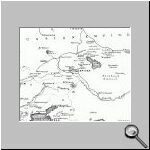
Alashkerd to Tabriz.
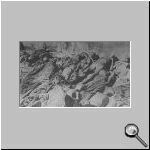
Christian children massacred in the desert.
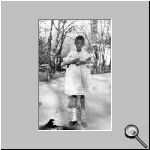
Refugee orphan at Erivan. Victim of forced starvation.
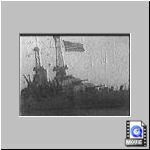
Battleship. Smyrna in flames. Refugees.
(1,1 Mbytes).
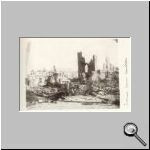
The Public Bath of Smyrna. Burnt.
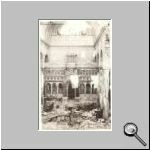
The Saint Ioannis Church.
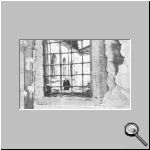
The patriarch wandering in the ruins of a burnt church.
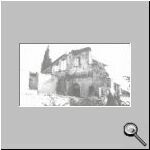
Church of Saints Constantine and Helene.
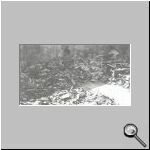
A destroyed ossuary.
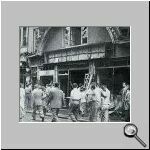
Destroyed Hellenic property.